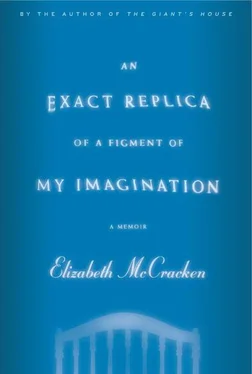Dr. Baltimore was a strange combination of businesslike practices and motherliness. She said to the dreamy waving image on the sonogram screen, “Hello, sweetheart!” But she could never quite look Edward in the eye. She was extremely smart and certain, and I found her smarts and certainty calming. On the other hand, every time we tried to explain that we were moving to the country, she came up with some vague plan in which it would be easy enough to come back to deliver in Paris. She did this so automatically and seamlessly — as though we’d asked for her to come up with a plan — that it was hypnotic. We never argued. “Right,” she said at the first visit, fiddling with a small, round paper wheel that reminded me of a teenage girl’s fortune-telling device. “Right. April 18. Well, you could just arrange to be back here for that month.”
The second visit, when we explained that moving back would be expensive and uncertain, she suggested we could just sleep on a friend’s sofa. The third time she said, well, I’d come in, and if everything looked all right, she could “help things along.”
It wasn’t till we’d left the office that I realized she’d meant induction. Oh no, I thought: Pudding’s birthday was his decision, not mine. Indeed we did come back from the countryside for a few appointments, for the amnio, for the big four-month sonogram, but then we decided it was time to look for someone closer to Savary, whether or not Dr. Baltimore thought it was a good idea. We heard awful things about the nearest hospital, in Marmande, and so we crossed that off our list and looked at the other nearby medium-sized cities.
My second doctor was a short, comical Frenchman who spoke idiosyncratic English and practiced in Bergerac, forty minutes away from Savary. He was the only English speaker at the hospital. Dr. Bergerac was in his forties, with black hair that looked painted on and high color in his cheeks. Altogether he seemed like a European hand puppet of a doctor. We sat in his office — he’d decorated the walls with Tintin posters, which made us like him — and he fiddled with the fortune-telling wheel, and said, “OK. Twenty-seven Avril.” This was how we learned that French pregnancies last longer than American pregnancies, at least officially.
Like Dr. Baltimore, Dr. Bergerac had a sonogram machine in his office, and on our first visit he gave me a routine ultrasound. “Il bouge!” said Dr. Bergerac. He moves! “You have had coffee today. You know what is the gender? Your last échographie, did he say?”
“I had an amnio,” I said. “So we know it’s a boy.”
“Yes,” he said. “I agree with this. It is a boy.” He moved the cursor on the screen and typed next to the relevant lump: B O Y.
Afterward he had a midwife give us a tour of the charming maternity ward. True enough, if something went wrong we’d miss the American Hospital with all its bells and whistles and impeccably clean floors, but this place seemed cozy. A midwife walked down the hall, carrying a red baby with a full head of dark hair. I had never seen such a baby. The Bergerac hospital clearly did good work.
My next appointment was attended by a very cute blond intern, who Dr. Bergerac was clearly trying to impress. During the sonogram, he spoke to her in French, explaining that we were writers from England, voilà, the placenta, a lot of English people liked to come to this area of France, the Dordogne, there’s the baby’s head, the English found it inspiring, look, the bladder. Then he told her to check my cervix and left the room to talk to Edward. I lay back. The intern rummaged around in the manner of an unhappy wife looking for a wedding ring in a garbage disposal: dutifully, thoroughly, but without much sentiment.
Afterward the doctor asked me how tall I was.
“Not very,” I joked.
“I suffer from this problem as well,” he said. “But ’ow tall? Do not answer in feets, I do not understand them.”
I shrugged. He gave me a flat-handed “please rise” gesture and appraised me.
“I am writing for you a prescription for pelvicscan,” he said.
“Pardon?”
“A hex-ray,” he explained.
At home I poked around on the Internet and asked doctor friends. As far as I could tell, there was no good reason for prenatal X-rays — they could really tell you nothing about how easy it would be to go through labor — and there seemed to be a slight risk of childhood leukemia associated with them. I e-mailed Dr. Bergerac to ask him if I could forgo it. He said no. Don’t worry! It’s not dangerous! But it is obligatory!
And so I just never went back.
(I’ve always thought I was five feet even, but at my six-week postpartum checkup, the nurse announced, much to my surprise, that I was five one. Which makes me 156 centimeters tall.)
Of course it occurs to me that Pudding might have lived if I’d stuck with either Dr. Bergerac or Dr. Baltimore. It’s a low-decibel wistfulness; I can barely hear it over the roar of later, louder regrets. This kind is not so bad, the If I Did One Thing Differently, Then Maybe Everything Would Also Be Different sort, a vague, philosophical itch: yes, if life were different, then life would be different. Such thinking feels like science fiction, stepping on a bug in 20,000 BC and altering the course of history.
Other memories are more troublesome. Here’s a length of time, my brain says, and then it stares, it sees an actual length of time suspended in the air, which then breaks into panels, as in a comic book. Here I am in one panel. I am in the line of danger, but I don’t know it, I am living in the past: the past being defined by the fact that Pudding is alive, but not for long. In the next panel, seconds later, something is supposed to intervene. Superman swooping in, to — what? Deliver the baby? X-ray vision and superhearing are nothing special, every doctor’s office comes equipped. Superman is supposed to come is all I know, so Pudding will persist.
But Superman never shows. I can see it so clearly. In one panel we are safe and stupid. In the next we’re only stupid.
Those moments come later, toward the end of the pregnancy.
X-rays and interns aside: the real reason I left Dr. Bergerac is that I didn’t love him. I wanted to. He was very cute and liked Tintin, and he even spoke English, but he was also authoritative, bossy about my weight, and far preferred talking to Edward (as Dr. Baltimore had far preferred talking to me). Before sonograms, he applied the necessary gel from a squirt bottle as though spraying a graffiti tag, and afterward he dropped wads of paper towels onto me from a height and left me to mop up. He made it clear that if he thought I needed an epidural, I would have one, no matter what. I didn’t know what to expect of birth, but I wanted it to seem like a collaboration. So I was delighted when, seven months pregnant, I found an English-speaking midwife through a midwifery Web site, a fox-faced woman name Claudelle who shared office space with a yoga instructor in a nearby town. At first I saw her with Dr. Bergerac’s blessing: at the Bergerac hospital, my monthly checkups would be with a midwife anyhow, and Claudelle lived much closer to us. At my visits she checked my blood pressure and asked me a variety of questions and once or twice had me bounce on one of the exercise balls she shared with the yoga instructor. I thought I would miss the sonograms, that is, until Claudelle put her hands on my stomach, and described Pudding.
“Ah,” she said, rounding the left side of me. “There ’e is. See,” she said, and put my hand in place of hers. “There is his back, on the left. A good place. Easy to get down. His head is down here. He’s getting ready.” Then she got out the stethoscope with the attached speaker and found the old-time radio coconut-shell horse hooves of his heartbeat. “Very good,” she said. “You hear? Tout est parfait.”
Читать дальше












